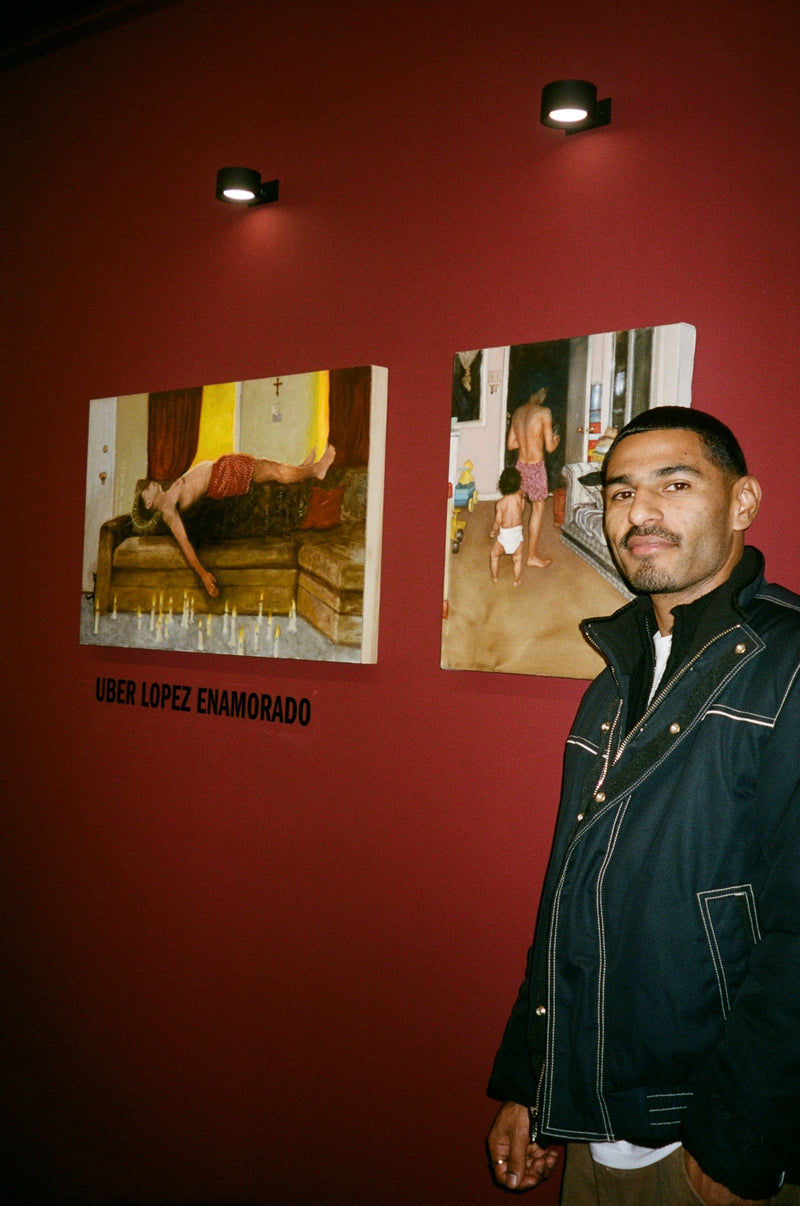
Tales from the Echobox 24
-
Tales From The Echobox
-
Tales From The Echobox
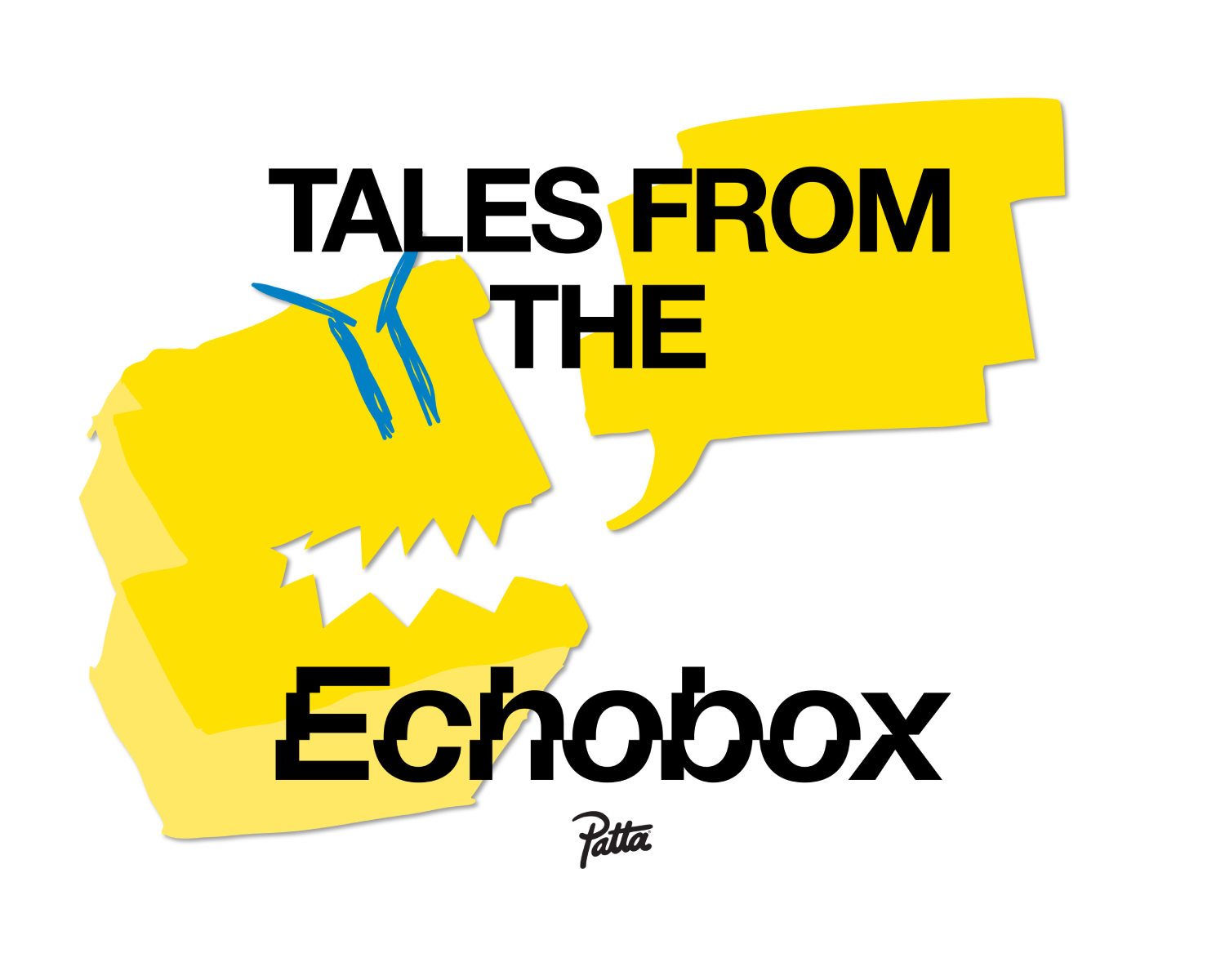
Interview by Monse Alvarado Alvarez
We are back with another Tales From The Echobox! In this conversation, we sat down with resident and multi-disciplinary artist Mila V in her studio in the heart of Amsterdam. We discussed her evolving relationship with music and community, the role of radio as a space for experimentation, and the importance of discovery in nightlife as her event Burst City approaches soon.

Your sonic and artistic practice consistently explores the unexplored and creates space for the unseen. When it comes to your radio shows, Altrd State (Operator Radio), and Witching Hour at Echobox, how do you approach the creation of them? Which possibilities of experimentation does this medium afford you?
I think it’s actually quite personal. I was doing music seriously for five years, and I noticed I was putting a lot of pressure on everything, almost killing the beauty of it. It became heavy; I wasn’t really enjoying it anymore because I was putting pressure on the projects and myself. Slowly, over the last year, I tried to find ways to regain joy.
I learned to DJ when I was around 15, but at the time, the scene in Amsterdam wasn’t like it is now. It wasn’t as open to women or to things outside the box. I tried, but felt discouraged, then moved away and stopped. Still, it always stayed in the back of my head.
The idea for Witching Hour was a way for me to delve into music and dedicate time to finding it, which is something I find so inspiring and sacred. When you spend time making your own music, you kind of forget to make time for discovery. It reminds me of the times when I was a teen, and I was always on my computer. Finding that back is very inspiring and allows me to not put as much pressure on it. Of course, there’s still a bit of pressure to do a good job, but Radio is soft in a way I can’t quite explain.
Witching Hour does not have to fit in a club setting; it can go in all directions within all different genres, and it’s very fun to make it, even if you don’t get that physical feedback. It is more creative, and it gives me room to experiment. In the future, I want to speak more because I have always had this fantasy of being a radio host!
For Altrd State at Operator Radio, it's more danceable and a bit more clubby. That is also inspiring because my own music is placed between those realms. It is another type of search which is also inspiring. Also, the vibe there is always super nice.
Your upcoming show at Melkweg ‘Burst City’, which you co-created with Parrish Smith, is a testament to community and alternative expression. For this second edition, what can people expect in comparison to the first edition?
This time we have more live bands, which was harder at Garage Noord because of the backline and infrastructure. Melkweg, being more pop-focused, makes that easier because it caters to more live acts. We wanted to mix bands in a clubbing setting. It is a podium, but it is also used as a club, so in a sense it’s perfect.
For me, it is a reflection of history in current days because for me Garage Noord is one of my favourite clubs, since it opened. Melkweg is an iconic venue, and it is another venue I would go to since I was 15. I saw so many bands in the Oude Zaal, so for me it’s truly a full-circle moment.
In terms of lineup, we kept the same spirit, mixing local talent with international headliners.
What would you hope to see in the future of the scene?
I hope people go to events to discover again, instead of only attending when they know exactly what to expect. For me, nightlife used to rely heavily on the element of surprise, of being overwhelmed by something unexpected.
Since COVID, things feel safer, more in-between-the-lines. Understandably, venues need to sell tickets. But I’d love to see more risks taken, and audiences open to not necessarily knowing what they’ll get and be more open to discovery.
What would you tell creatives trying to make space for their creative projects?
I would tell them to not be afraid to show who you truly are. And don’t feel ashamed to take up space. Some creatives aren’t necessarily comfortable being in the spotlight, and nowadays it is so much about that. Some people get discourage by this, but it is really about finding your own way. In the beginning I was more insecure and tried to cater to what I thought people wanted from me, instead of what I really am.

You often explore the raw, darker side of sound, art, and hence, of your own identity. How was your journey into embracing what people are often too afraid to face? What has it thought you throughout the years about your (artistic) projects and the communities you surround yourself with?
It’s been a long journey. Everyone has their own timing, some find themselves early, others take longer. And that’s okay. It’s not easy. You have to be willing to make mistakes, learn from them, and not see them as failures. Also, making room for imperfection, because striving for perfection is not helpful. It is all a learning curve, some of it comes from age and some from life experience.
What has it thought you throughout the years about your (artistic) projects and the communities you surround yourself with?
The community is so important. For me, it feels like returning home. As a teenager, the alternative scene helped me form my identity and gave me my closest friends and like-minded people outside of school. It was a place I could develop myself and my interests.
Now I see how much those influences still shape my work. Playing at Grauzone Festival last year was another reminder. It is such a sick place which represent all of this that I am talking about. It is nice to see the same people are still around, and so many new ones too.
Tune in to Echobox - broadcasting from below sea level every week, Wednesday until Saturday.
Related Articles
-
 Patta hosted the launch of 1012 / 10012: Diasporic Iconographies, an exhibition at Patta Amsterdam exploring shared visual languages across Surinamese and Latinx diasporas. Through imagery, symbolism and reinterpretation, the exhibition traces how culture travels, transforms and continues to shape identity across generations.The opening brought together community, creatives and collaborators for an intimate evening at the space — setting the tone for a weekend rooted in exchange, reflection and presence. From the works on display to the energy in the room, the launch marked a moment of convergence between histories, influences and lived experience.
Patta hosted the launch of 1012 / 10012: Diasporic Iconographies, an exhibition at Patta Amsterdam exploring shared visual languages across Surinamese and Latinx diasporas. Through imagery, symbolism and reinterpretation, the exhibition traces how culture travels, transforms and continues to shape identity across generations.The opening brought together community, creatives and collaborators for an intimate evening at the space — setting the tone for a weekend rooted in exchange, reflection and presence. From the works on display to the energy in the room, the launch marked a moment of convergence between histories, influences and lived experience. -
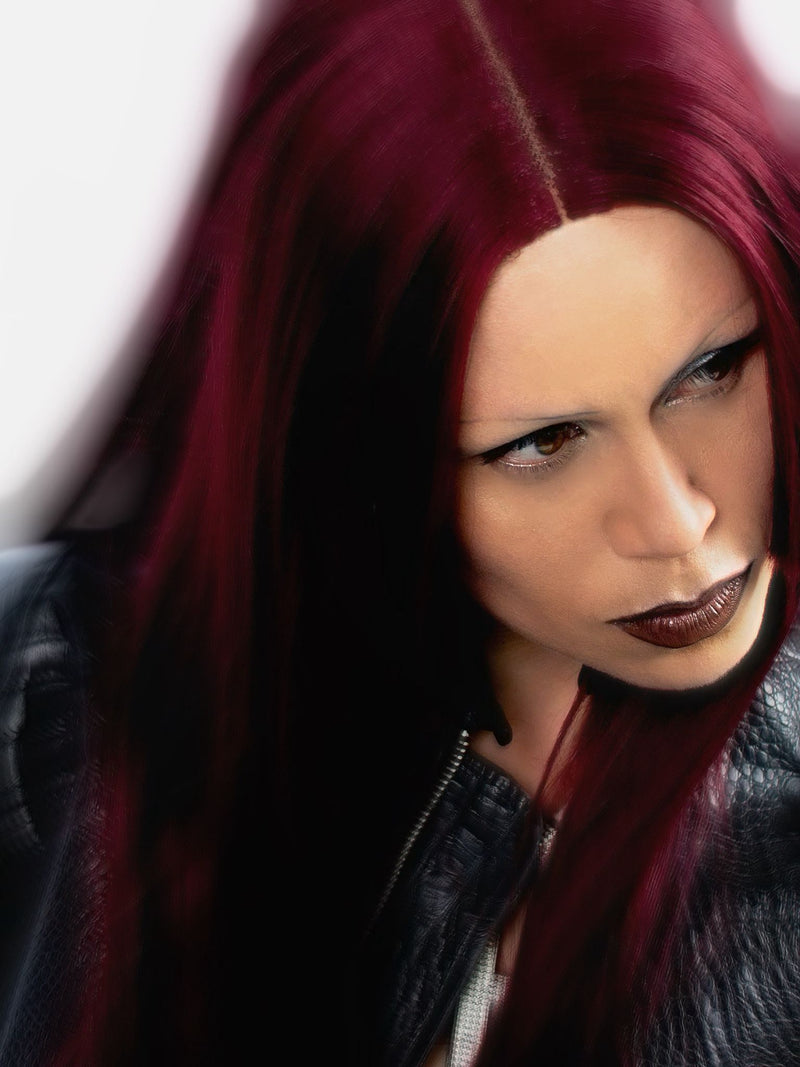
Get Familiar: Slimfit
Get Familiar: Slimfit
Interview by Passion DzengaRaised on soul, funk, punk, and the sounds of Suriname, Amsterdam-based artist Slimfit (Sammie Tjon Sien Foek) grew up in a home where The Cure played alongside Afrocaribbean classics, and LimeWire rabbit holes turned into early sonic education. Before ever stepping behind the decks, they were already building worlds—collecting obscure tracks, experimenting across disciplines, and shaping an ear sharpened by both Western and Afro diasporic influences.Their entry into Dutch nightlife came through Red Light Radio, a chance set that caught the right ears and opened the doors to Amsterdam’s rave ecosystem. From working the door at Garage Noord to becoming a fixture in contemporary club culture, Slimfit has always absorbed the scene from every angle. Today, their sets erupt with high-tempo emotion: Latin percussion, Afro-electronic rhythms, dramatic vocals, and a rave aesthetic that brings play, camp, and chaos back into techno’s often serious spaces.But Slimfit ticks many boxes—they’re a multidisciplinary artist, a thinker, and an advocate. Their work in nightlife is inseparable from their politics: pushing for equitable lineups, safer club environments, fairer fees, and solidarity structures that support marginalised communities. For them, sound is intuition, resistance, and connection all at once. In this conversation, Slimfit speaks about their roots, the evolution of the scene, and why the future of rave culture must be both louder and more caring.What music filled your home growing up?My dad—he’s Surinamese—played soul, funk, rap, the classics, plus Surinamese music. My mom was into The Cure and punk. I learned all the “golden oldies,” and as a teen, I dug deep on LimeWire and YouTube, hunting obscure tracks and making playlists in my room.Victor Crezée was one of the first to book you. What were those early experiences in Dutch nightlife and beyond?I started DJing about eight or nine years ago. One of my first breaks was a guest slot on Red Light Radio through a London–Amsterdam program. Vic heard that show, loved it, and connected me with Patta Soundxystem. Around the same time my first agent/manager, Mo, found me — I worked with him for many years, and he played a huge role in supporting and shaping my early trajectory. I got booked for Applesap, and I gradually shifted from a hip-hop/new wave/punk background into a more rave-leaning aesthetic. I also worked the door at Garage Noord for about a year—that scene shaped a lot of my influences.Why radio? Were you already making mixes?Totally—I had strong ideas about sets and mixes and kept building “potential” playlists from niche internet collectors. I was hungry for a radio show, had tons of music ready, and a clear concept of what I wanted people to hear. It happened to line up with Vic’s taste.You’re multi-disciplinary. Where does music sit among your practices?Everything I do is informed by sound—film, performance, graphic design, sound design. I studied photography and philosophy, but it all converges in audio. Sound is my intuition.Slimfit is the name people know you by in music, and your other work sits under your real name?Yes. I keep a portfolio under my own name (video, performance, design, drawings). I’m also finishing a master’s at the Sandberg Institute.How do you stay motivated across so much?I’m obsessed with getting what’s in my head into the world. I have scattered interests, constant inspiration, and a big ambition that keeps me moving—but I’m still learning how to pace myself and not do everything at once.Practical advice for artists trying to “do it all” and stay healthy?Sobriety (especially on the job) helps me stay clear. Surround yourself with grounded people who truly check in on you. I’ve just started going to the gym, and I meditate—my mom’s best friend is a Zen teacher, so I grew up around that. Finding silence amid subwoofers is key.You’ve become more socially engaged. Why do nightlife and activism merge for you?Club culture was built by people of colour seeking resistance and community. That political awareness is embedded in electronic music and rave spaces where initially marginalised identities used to gather for psychological relief and self-expression. My dad’s social work and left-wing politics background also shaped me. If we want safer, freer dance floors, we need to be politically aware and critical of the industry’s capitalist realities.What has changed in the scene since you started?It was very male-dominated; all-male lineups were normal. Awareness grew, and more women and people of colour got booked and curated—especially in the underground. There’s still work to do: commercial lineups often position POC people, queers, and women as openers. But we’re more than props for diversity — whole generations before us have built this scene.Can commercial ecosystems support underground/marginalised communities without tokenising them?No, I think that’s impossible if money pressures push events towards private equity and morally questionable financial partnerships. One alternative is building solidarity mechanisms into programming. During the KKR/Milkshake boycott (which I helped initiate alongside many artists and a broader movement), we launched RUIS—Reimagining Us in Solidarity—normalising fundraisers at larger events and proposing ethical advisory structures so donations are built into the night, not an afterthought.Are union-like structures part of the answer?Yes. With funding cuts and precarious nightlife economics, alternative organisation matters—mutual aid funds where artists contribute monthly and can draw support during illness or crisis. We need networks where artists can refuse exploitative money and still survive.Fees, fairness, and “artist care”?Equal-pay approaches simplify programming and reduce hypocrisy. If artist care is strong—dinners, mental-health spaces, genuine hospitality—you don’t need extreme fees to feel valued. Treat people like royalty and the money conversation gets easier.How important are safe spaces—both for you as a performer and a dancer?Non-negotiable. I can be expressive and sexy on stage, and I want femmes to dance freely without fear. If you do drugs, do it safely with people you trust. Dark rooms should be monitored. Unsafe spaces are traumatising—I don’t want to go back to that.Golden rules for keeping artists safe in the booth?Don’t touch without consent. Respect personal space and focus. Performing is part of my concentration—don’t ask for drink orders or requests mid-mix. Safety riders matter: have a manager check in every 20–30 minutes; deploy floor/club angels to monitor the crowd, especially when intoxication escalates behaviour.Is safety only the club’s job, or also the crowd’s?Everyone’s. Check on your friends; take them outside if needed. Hedonism can mask deeper issues. Community care reduces escalations.How would you describe your sound to someone who hasn’t seen you?High-tempo, emotive, harmony-driven, dramatic vocals, lots of rhythmic variety—Latin American and African diasporic influences (think neoperreo, gqom) woven into rave energy. I missed fun, camp, and hips in monotone techno, so I bring drama and play back into the rave. Outside the club, I love experimental/left-field—Arca, FKA twigs, even noise.Are you intentionally bridging serious techno spaces and playful queer energy?Yes. Purists safeguard culture, but artists can fuse worlds. I’ll play fast “TikTok-techno” rooms and slip in niche genres to widen ears—teaching through selection while being open to new iterations.Any anthems or artists that captured your story this year?Wanton Witch. She blends club, bass, and Asian tonalities in ways that resonate with my own Chinese-Creole roots—my great-grandfather moved from China to Suriname. Her tracks feel like that journey.How important is the representation of diasporas on the dance floor?Hearing your culture loud in a club is powerful. I try to program in ways that let people feel “seen” for a moment—like they’re the superstar.If Slimfit were a dish?A Sichuan dish—mouth-numbing, punchy, salty, spicy, refreshing.And if Slimfit scored a film?Under the Skin—a seductive, alien coming-of-age into something strange and monstrous. Luring you into an absurd world.-
Get Familiar
-
-
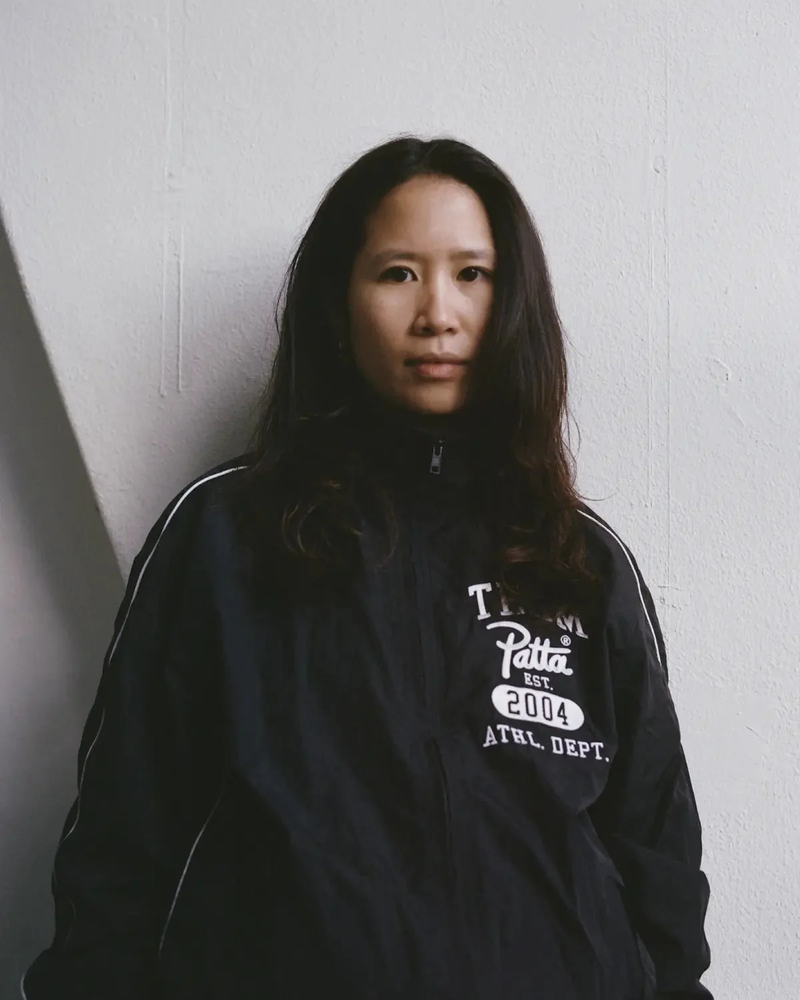
Get Familiar: TWIENA
Get Familiar: TWIENA
Interview by Passion Dzenga | Photography by Kwabena Sekyi Before the RAUM residency and festival crowds lost themselves in her rolling basslines, TWIENA was a child at a piano, doing exactly what many Asian parents hope their children will do. The real spark, however, came later. Calm by nature, she describes her emotions as mostly steady, almost flat — until music enters the room. That’s when everything intensifies, and she allows herself to genuinely feel. What started as quietly producing melancholic, melodic tracks during workshops grew into something heavier once she fell in love with techno’s four-on-the-floor hypnosis. Corona provided her with the unexpected opportunity to take it seriously: endless hours in a Rozengracht studio, playing for friends until the identity of “DJ” stopped being just an idea and became muscle memory. From there, her sound expanded — techno fused with and Latin grooves, always led by the bassline and rooted in the body. Now, as an Asian artist in European nightlife, TWIENA navigates multiple worlds simultaneously: a competitive perfectionist who refuses to be boxed in as a spokesperson, a mainstay of the queer scene using her RAUM residency to cross-pollinate communities, and a Vietnamese diasporic artist blending temple field recordings and childhood memories into tracks like “Temple Run” for BAYANG and No One Magazine. In this conversation, she traces that journey — from piano lessons and early raves to representation, roots, and why her sound, if it were a dish, would be soft-serve with colourful sprinkles. Let’s start at the beginning. What were your first experiences with music, and what was playing around the house when you were growing up?I’m Asian, so in very classic fashion I was sent to piano lessons as a kid. That was my first real introduction to playing music myself.But I only really started thinking about making music when I got into a relationship with Zoah (my current booker). Her dad is a musican and her brother use to produce music, and around that same time I started hanging out with the ALLE$ crew, who were also doing music. This was like almost 10 years ago now but I’ve always been very specific about melodies and what I like emotionally in music. My emotions are usually pretty stable – I don’t have huge highs and lows – except when it comes to music. That’s the one thing that really makes me feel something.So I started experimenting at home: playing chords, playing around with notes, letting myself be emotional in that space.You started with production first. How did that lead into DJing?Yeah, I began with production. I did some workshops and taught myself, mostly making melodic, sad music as a hobby on the side.Then it slowly shifted. I’d been going to techno parties since I was 16 or 17, and I really fell in love with that four-on-the-floor techno energy. At some point I thought, Let me try making that too. I liked it so much I realised: This is the music I actually want to put out into the world. And the best way to do that was to play it.Eycee was a big influence—he taught me how to DJ. I’d already been saying out loud, “I want to DJ,” even before I could actually do it, which is a form of manifesting. Once I started playing and got the techniques down, things moved pretty quickly.From starting out to taking music seriously as a career—it can look “fast” from the outside, but it obviously took time and courage. What helped you really commit?Corona, honestly. The pandemic wiped so much away and weirdly created space—like a reset. It felt like a new wave of opportunities, and I was lucky to be in that moment. We had a studio at the Rozengracht, this big space where someone built a big stage with a DJ booth in the studio. Because there was so much time, I could be there constantly, playing and practising.People were always coming in and out, and we’d throw little parties. I actually didn’t tell people I was a DJ—I don’t really like defining myself that way. I usually say I play music. Back then, I didn’t say it out loud at all; I would just post a lot of videos of me DJ’ing on Instagram stories. That helped grow my identity as an artist in a natural way, instead of some big, dramatic switch.You’ve spoken about being drawn to 4/4 techno. What was it about that sound that made you think, “This is where I belong”?The first time I really felt techno, it was the four-on-the-floor kick and how it puts you in a trance. The rhythm just doesn’t break—it keeps you in this zone.Over time, especially after DJing and producing more, I started to understand how broad techno actually is. Now I’m very focused on the feeling of the bassline—the rhythm and groove there. That’s become essential to me.Right now I’m drawn to basslines and grooves that overlap with Latin influences. I like making techno feel a bit more sexy and bodily, not just cold and aesthetic.You mentioned bubbling, dancehall, Afro sounds too. How did those textures enter your sound?In my teens and early twenties I was a hardcore techno head—raves, raves, raves. Then around 21–22, my world shifted; I discovered more hip-hop-adjacent sounds, and what people might call “urban,” even though I don’t love the word.I got into Afro-inspired music, reggaeton, bubbling, dancehall—that whole world. It’s completely different from techno, but it still lives in the same universe for me: music your body connects to. I loved bubbling and dancehall for dancing and partying.Now I bring those worlds together. The music that moves my body—whether it’s ravey techno or sexy bubbling—naturally slips into my sets and productions.Nightlife has historically been a very cis-het, white space, especially in Europe. As an Asian artist, did you feel represented in clubs when you started?Obviously there’s Peggy Gou—we can’t deny Peggy Gou. I wouldn’t say she’s my personal inspiration, but she’s very cool and she’s out there.But no, there weren’t many Asian artists like me around when I started. And honestly? I liked that. A lot of people say, “There was nobody I could relate to,” which is valid. But I enjoyed the fact that there weren’t many Asians—because it made me unique.Being Asian is also part of my selling point, if I’m honest. And when I came in, things were already shifting—more space for artists of colour, more focus on women, queer people. I didn’t grow up in Asian communities; my surroundings were mostly white. So I did feel culturally different, but I didn’t only see myself as “the Asian one.”What I did see was an opportunity—for myself and for the Asian community—to step into that gap, to be someone people can look at and think, “Oh, that’s possible for me too.”Does being a visible minority on line-ups come with pressure—like you have to be the best representative?Not in an “Asian representative” way, no. I feel pressure because of who I am: I’m competitive. I always want to perform at my best and, in my head, be “the best”—even though that doesn’t really make sense, because my sound is different from other people’s.So my focus is on staying unique and perfecting my own thing, not on being the spokesperson for all Asian people. I don’t want that role. I do like that I can be a role model for some, but my intention is to inspire people in general, not just one community.If you’re a perfectionist and competitive, how do you leave space for experimentation in your sets and productions?My taste changes all the time—much faster than I’d like, honestly. Every week I discover something new: a track in a club, a new artist, a promo. I’ll hear something and go, “Oh my god, this is so cool,” and it naturally sneaks into my productions or DJ sets.So I’m constantly being inspired. I’m very active in the scene—not just profiting from it. I’m on the dance floor, I listen to promos, I dig. That keeps me experimenting. It’s part of the job, but it’s also part of my personality.I integrate new influences into what I already do, and that’s how I evolve without throwing away my core sound.When you’re crate-digging, what makes you say, “This track is really me”?Right now, it’s all about the bassline. That rolling, hypnotic, dynamic bass. I know my sound quite clearly in my head—it’s very specific. I’m always searching for that particular groove and rhythm. I used to think it was all about percussion—off-beat snares, hi-hats—but now I know the actual groove lives in the bass.If the bass is static, it’s almost impossible to create the feeling I want just with percussion. The kick roots the track, but the movement—the part that makes you roll your hips—sits between the kick and the bassline.What’s the ideal space to experience your sound—clubs, festivals, something in between?I love both, but in different ways.Club-wise, RAUM is really my home. I can move around that space so comfortably. I’m a pack animal—I never go out alone, I’m a “wolf pack” person—but RAUM is the only place where I actually feel comfortable being alone. That says a lot.I also love a good festival. I like adventure, and festivals give you different chapters in one day. Dekmantel is my favourite—there are so many communities coming together there, and the musical curation is amazing.You’re a resident at RAUM. What has that residency opened up for you, and how does that space give you the opportunity to fully experiment with your sound?So much. Through RAUM we played Wire Festival in New York this year, for example. As a resident, I can also curate my own nights and invite artists who fit my taste.What I love most is the chance to bring sounds I love—like bubbling, dancehall, or more Latin-influenced techno—into a queer space. RAUM is a safe space, but it’s also big and flexible. You can cross-pollinate different communities there.I don’t want queer nightlife to be so exclusive that nobody else feels welcome. I want people from different backgrounds to experience a space where queer people take priority and feel safe, but everyone is invited to share the same values.Queer nightlife often swings between hard raves and glitter-pop clichés. Do you think it has to be tied to one sound, or is there room for more variety?There’s absolutely room for variety.RAUM is a great example: that crowd will twerk to techno. They appreciate bubbling and dancehall and they love techno. It’s a space where you can invite different sounds and people stay open.Queer isn’t a genre. It can be everything and anything. That’s why I love playing there—it all fits under the same umbrella when the crowd is open-minded. You’re part of the first BAYANG Various Artists compilation, and you also released on No One Magazine’s vinyl. How do these projects connect to your Vietnamese roots?BAYANG is a label by Ennio and Hamy—two Asian artists who wanted a platform to represent and inspire Asian artists and the diaspora. They asked me to be part of their first VA release, which felt very aligned with where I am right now.Earlier this year I released my first track on vinyl through No One Magazine, which highlights queer nightlife in different cities. For the issue focused on Vietnamese queer nightlife, I made a track using a sample of a monk I recorded during a very fragile time in my life.I brought that same sample and atmosphere into my Lowlands festival introduction, and again into my BAYANG track. All of it ties back to my Vietnamese roots—to temples, to memory, to past and present colliding. The last months of my music-making have been very much about heritage and looking back in order to move forward.As part of the diaspora, how important is it for you to look back in order to move forward?Very important.The past—personal, cultural, generational trauma, all of it—shapes how you move through the world. If you can pinpoint where things come from, you understand why you do what you do.So yes, you have to look back: at family history, at culture, at the things that hurt and the things that grounded you. That’s how you build a future that feels honest instead of random.You mentioned playing in Vietnam. What was that like, and how do you see the Vietnamese scene from where you are now?About three years ago I realised there was a real scene—and a queer scene—in Vietnam. Before that I honestly thought it didn’t exist, or that they were living in a completely different time.I played at Savage in Hanoi, and it was eye-opening. You can definitely be a role model there as a diaspora artist. It’s not my main focus right now, but it’s an important connection.What’s beautiful is that that Vietnamese scene somehow travels back here. There’s now a little network of people in Amsterdam who are connected to the Vietnam scene and to each other. Same in Paris, in the US—Vietnamese diaspora are finding each other worldwide. It feels like a huge spiderweb of like-minded people.One track that sums up where you are right now?Honestly, my own track on the BAYANG compilation: “Temple Run.”It’s the first time I feel like, This is really my sound—something I can’t find anywhere else because I’m the one doing it. It’s very tied to my Vietnamese roots and to the feeling of being at the temple as a kid, running around with my cousins.The name comes from the game Temple Run, but also from that sensation of moving through a temple—sacred, playful, a bit nostalgic.Is there a specific sound or element you can’t live without in your production right now?Rolling basslines, for sure. And toms—I love toms. I use a lot of round sounds. Within the wavetables, the sine waveform is definitely my kind of sound. The reason I like sine waves so much is because the sound is so clean. I really love the bleeps and the bells in my music—that clarity and roundness just feels right to me.If your sound was a dish, what would it be?It wouldn’t be heavy. I think it would be like soft-serve ice cream—the swirl kind—with colourful sprinkles. Smooth, playful, not too much, but still with a little extra on top.This December 26th, head to Tilla Tec for COLORS x Studio Strip. TWIENA will be behind the decks alongside Cinnaman, Jyoty and Anel, coming together for a night that celebrates boundary-pushing sound and shared energy on the dancefloor. A Boxing Day session worth stepping out for—don’t skip it.-
Get Familiar
-
-
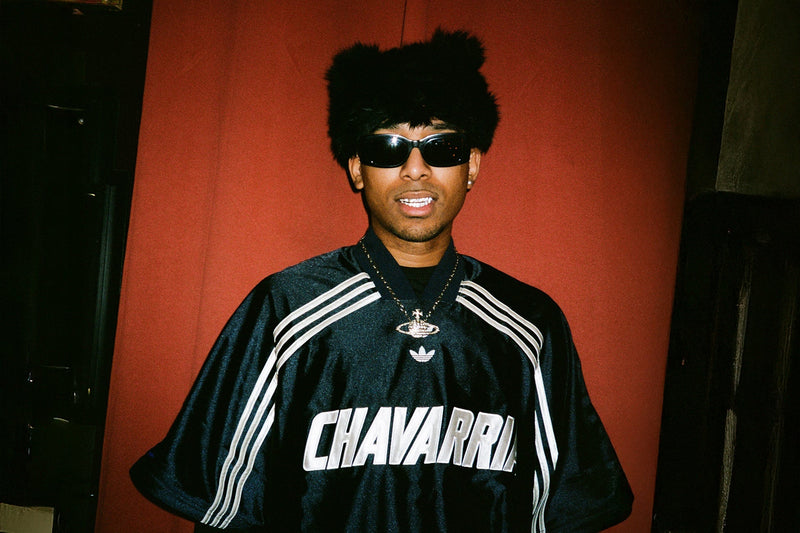
What went down at the Willy Chavarria x adidas Originals launch
What went down at the Willy Chavarria...
Photography by Mazen el Majdoubi Patta is proud to host the release of the new Willy Chavarria x adidas Originals collection — a December drop that blends adidas’ historic codes with generations of Chicano style influence. The collection features powerful silhouettes, rich textures and rose-embroidered details that speak to identity, community and craft.To open the launch, we held a private dinner unveiling 1012 / 10012: Diasporic Iconographies, an exhibition at Patta Amsterdam built around the shared languages of Surinamese and Latinx diasporas. Through imagery, symbolism, and reinterpretation, the exhibition explores how culture travels, transforms and continues to shape expression today.The exhibition is open to the public through the weekend, where visitors can also purchase the full collection in-store.-
What Went Down
-
-
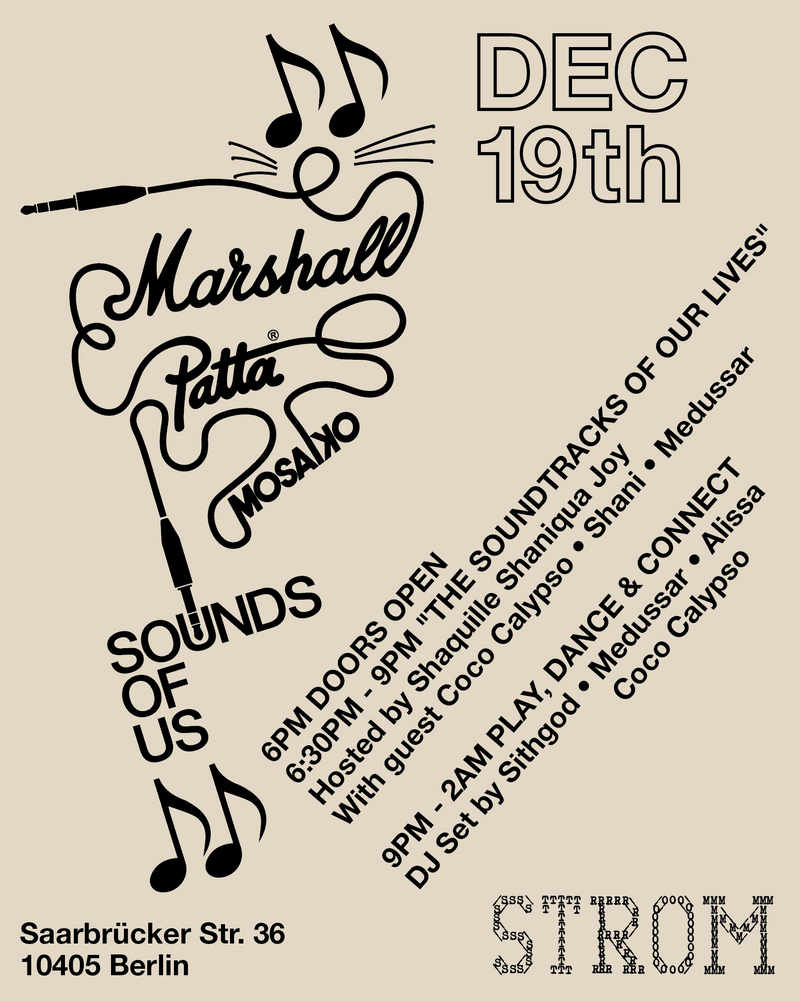
Patta x Marshall x Mosaiko - Sounds of Us
Patta x Marshall x Mosaiko - Sounds o...
We’re closing out the year in style. Join us on Friday, December 19th at Strom Café, Berlin for a night of community, creativity and sound — where cultures connect through music. Expect good vibes, better people and a celebration of the sounds that make us who we are. RSVPs for the Soundtracks of Our Lives panel are now full — confirmation emails have been sent to everyone selected. The after party starts at 21:00, open to all, free entry, first come first serve. Pull up, get familiar, and celebrate with Patta x Marshall x Mosaiko. Any questions? Hit up the DMs of @mosaikomag.-
Events
-
-
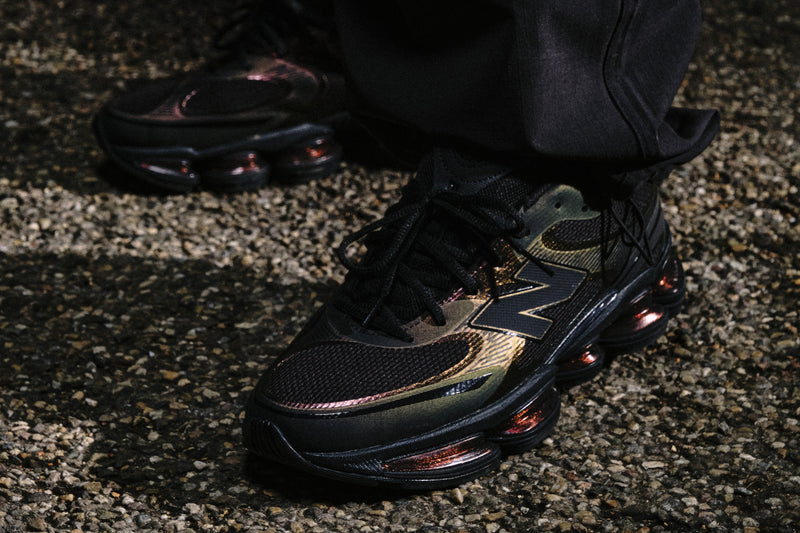
New Balance Abzorb 2000 as seen by Patta
New Balance Abzorb 2000 as seen by Patta
Photography by Ben Drame Before the Range Rover freestyles, there was a kid in a small Dutch town falling in love with sound. For Narco Polo, music was freedom — burned CDs, scratched discs, and hours lost in hip-hop’s golden age. Now, from sneaker shop cyphers to national stages, that same DIY spirit fuels his art. This is New Balance Abzorb 2000 as seen by Patta, we recently spoke to him to get familiar with Narco Polo’s evolution— a portrait of balance between hustle, heritage, and home.-
as seen by
-
-
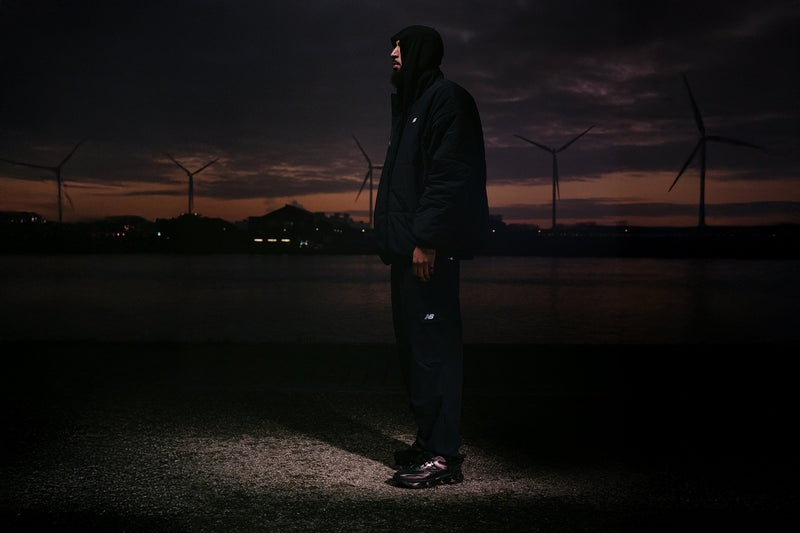
Get Familiar: Narco Polo
Get Familiar: Narco Polo
Interview by Passion Dzenga | Photography by Ben DrameBefore Narco Polo was running up 101Barz, Range Rover freestyles and New Balance campaigns, he was a kid in a small town near Nijmegen, staring at a Dangerous-era Michael Jackson CD like it was a portal. From there it was hand-me-down Wu-Tang and 2Pac discs, scratched Green Day and Offspring albums, LimeWire folders full of East Coast, West Coast and French rap – the kind of informal education you only get from older brothers, neighbour kids and hours spent skating and playing video games with a Discman in your backpack.That DIY school of hip-hop still lives in his music today: soulful, underground and wordplay-heavy, somewhere between golden-era boom bap and the trap that later reshaped his taste. He taught himself to produce on cracked software in a student room, found his first audience freestyling in a Nijmegen sneaker shop, and built out a world with the Alle$ Lifestyle collective before moving to Amsterdam to take things further.Now, Narco Polo is one of the voices quietly reshaping Dutch rap from the inside – through jazz-flecked tapes with Styn, brutally honest car sessions filmed in his own Rover, and lyrics that read like pages from a private journal. Between four kids, two companies, meditation retreats, his own headline shows and support acts for International stars and Dutch OGs, he’s still obsessed with the same thing that grabbed him as a teenager: making music that feels real, lasts longer than the algorithm, and pushes Dutch hip-hop into a lane it hasn’t fully claimed yet.How did the first spark to get involved in music come to you?I grew up surrounded by CDs and a little home stereo. One day I found a Michael Jackson CD – I think it was Dangerous. The cover alone blew my mind, so I put it on… and then listened to that album every day after school for months.From there, my big brother was a huge influence. We were inline skating, doing stunts, and he’d always play Green Day, The Offspring – that kind of stuff. Later, he came home with a Wu-Tang CD and a 2Pac CD. That was my first real hip-hop experience. From then on, I never looked back. I even had the Wu-Tang logo on my wall, wore Wu-Tang clothes, bought the PlayStation game… I was deep in it.When LimeWire and torrents came in, it was over. I found this one Blogspot where hip-hop from all over the world was listed – East Coast, West Coast, UK, France, everything. I’d just download and dig. A friend’s older brother was also a hip-hop album collector, so whenever we were skating or gaming at his house, we’d be listening to CDs. That was my real “digging in the crates” era.Was that Michael Jackson CD from your brother or your parents?It was from my parents. My dad was a fan of George Michael and U2. My mother was more into Otis Redding, Marvin Gaye – she’s a soul fan. They had a lot of wedding and party classics. So I had tastemakers all around me: parents, brother, neighbourhood kids. Once I got on the internet and torrents, I could finally explore my own taste deeper instead of just following theirs.Where did you grow up, and what was your environment like?I’m from the south of the Netherlands, around Nijmegen – small town energy. I was hanging out with kids from the neighbourhood, skating, sharing music, playing PlayStation. That mix of skating culture and hip-hop really shaped me.Did you ever take formal music lessons? When did you first actively start making music yourself?I never took music lessons. The first real step into making music came when I moved out and had a roommate who made dubstep in Reason. I loved how the software looked – like a game – so I asked him to share it.Back in my own room, I started messing around with samples and loops. I downloaded a huge library pack, like 5–6GB, and just started making beats in Reason. I was about 20–21, so I started relatively late.Did you start by making dance music like your roommate, or something else?Nah, I didn’t really f*** with dubstep like that. I just liked the software. From day one I was chopping and making hip-hop beats. Wu-Tang and that raw sound were my starting point.What did those early beats sound like?Very raw, underground hip-hop – heavily influenced by Wu-Tang and that 90s aesthetic. Over time it got a bit more soulful. Later, when we linked up with Samuel Kareem, the sound shifted more into trap.Sam is a crazy producer, 50 times better than I was at the time. It was almost demotivating – I’d have a session with him, go home, open my laptop and realise I couldn’t do what he did. So I stopped producing for a while and focused on rapping, while he handled production. That’s when I really moved from classic hip-hop into trap. Nowadays I’m back in a place between soulful, underground hip-hop and trap – closer to what I grew up with.How did you go from making beats in your room to taking music seriously?I started working at a sneaker shop in Nijmegen. There I met Nico, who was always freestyling. He’d rap on my beats in the shop. Eventually I started writing verses too, and we’d spit while customers were walking in and out. People vibed with it, and that gave me motivation to make more beats and write more.Aki also worked at the sneaker shop. He was already an MC at dubstep/EDM parties. The city of Nijmegen organised a workshop: producers and artists got paired up with bigger names for six to eight months. We’d learn, make beats and write songs, and at the end we’d put out an album and perform at the city’s big summer festival.I produced two beats for that project and DJ’d the live show. On the festival day, the act before us had almost no crowd. We went on, played the first track – and within minutes the venue was packed. That feeling told us, “OK, people f*** with this. We have to do something with it.”After that we built our own studio, started making music every day, and eventually linked up with Sam. That’s when Alle$ Lifestyle was born.What is Alle$ Lifestyle, and what is it now?Alle$ Lifestyle started as a group of friends who love making music – hip-hop at the core, but really all genres because Sam can produce anything. It’s a collective of brothers and sisters who are creative and support each other.At some point it became more business-like, but now it’s returned to being a creative collective again, which I love. It’s about supporting each other’s art, not just the business side.You mentioned moving to Amsterdam. Why was that important?At some point we realised we’d done what we could from Nijmegen. The scene, the industry, the infrastructure – it’s all much bigger in Amsterdam. So we moved one by one. From there we started releasing more consistently, met people like Rimon, and the whole Alle$ Lifestyle universe really expanded. That’s also when I started releasing solo as Narco Polo.How would you describe the Narco Polo sound?Soulful, underground hip-hop. Warm, but with a dark, streetwise edge. Wordplay-heavy, influenced by jazzy and boom-bap textures but done in a modern way. I lean heavily toward American hip-hop. There was a period where I listened to a lot of Dutch hip-hop, but mainly an older era. Before and after that, it’s mostly US stuff for me – that’s always been my biggest influence.Do you feel that “classical” hip-hop sound is well represented in the Netherlands?Not really. There are a few people doing it, but it’s either very underground or very pure boom-bap. I’m trying to find a middle ground – something rooted in that golden era, but still current and accessible.I feel like I’m laying some groundwork. If there were more Dutch artists making exactly what I love, I’d be listening to them all the time.What draws you specifically to that jazzy, soulful, golden-era sound?It’s what I grew up on. When LimeWire arrived and I could really dig, I discovered a lot of jazzy hip-hop. That was my soundtrack for everything—being outside, skating, playing PlayStation.We went from Discman to Walkman to MP3 player, and I was always collecting new tracks. Trap only arrived later – with Chief Keef, Young Thug, Kodak, Future… I love that too, but the foundation is jazzy, underground hip-hop. That’s why it still lives under everything I do.What is a typical studio session like for you?It can start anywhere. Sometimes I come in with verses already written and we work around that. Sometimes the producer plays beats and I catch a vibe.With Sam, it often went like this: he’d start building something from scratch, I’d react in real time – “keep that,” “loop this,” “add drums like this.” Sometimes I’d mumble melodies or flows first, then write the actual words later.Right now life is busier – shows, family, our agency, campaigns – so I often need to block out time, go on a writing camp, or spend 2–3 days straight in the studio. Before it was more spontaneous; now I have to create space for the flow.How important is collaboration to your creative process?Very important. I love working with producers who “think with me” – like Aki, Sam Kareem, Styn, WillyMakeAMillie. We all add something: one comes with beats, another with melodies, I bring verses, and we help each other refine everything.With Styn especially, it’s a real partnership. He’s a professor in sampling – a proper nerd in the best way. Without his knowledge we wouldn’t have some of these crazy beats. The more you work together, the more you understand each other’s taste, which makes the music stronger.How did your collaboration with Styn come about?We’d known of each other for a while but weren’t really hanging out. Then he started dropping edits and remixes of Dutch artists over his own sample-heavy beats. I heard them and thought, “These are better than the originals.”So I hit him up: “Yo, this is crazy. Send me some of these beats.” He started sending beat packs. For the first EP, I mostly just picked my favourites, took them home and recorded on my own. Later we did more sessions together in person.Now we have two EPs out and are working on a third. It’s still in progress, but it’s coming.Your car sessions have become a big part of the Narco Polo world. How did those start?I love cars. I used to rent them all the time, and eventually bought my Range Rover – that’s my baby, had it for about five or six years now. I was struggling with online content. Besides releases, I didn’t like talking into my phone or posting just for the sake of it. I wanted something that fits who I am.So I thought: I’m always in the car, I love old-school hip-hop, and I’m good at rapping. Let me write verses on classic instrumentals – Snoop, Mobb Deep, Dr. Dre, all that – and record them in the car.It worked: the beats are instantly recognisable, the car looks good, I’m dripped out, and the raps are strong. It’s DIY but visually sharp. Sometimes the car sessions even perform better than official releases. Big artists started noticing, media mentioned it, and me and Tads did a few together.Last year the police took my license for a year because of weed traces in my system, so I had to pause the car sessions. I just got my license back, so I’m planning new ones around upcoming releases.Do you produce and shoot the car sessions yourself?Yes. It’s all self-produced – I pick the beats, record the audio, shoot the video, edit, colour-grade. Because I’m also a producer and know my way around the studio, I can do the whole chain myself. That’s part of why it feels so authentic.You’ve also done 101Barz and other platforms. How was that?101Barz felt like a rite of passage. I went at the right time and I’m glad I did it. I did adjust a bit to what that audience likes—next time I’ll probably do it even more on my own terms—but I’m happy with it. I’ve also done sessions with FunX, Podium ZWART, 3voor12 and more. When the album drops, I want to hit all those platforms again with something to promote.Your track with Navaron Cole, “Rattenvanger”, was nominated for a Rotterdam Music Award. How did that collaboration and song come about?We met randomly in Paris. I was walking alone, heard some guys speaking Dutch, said something, and it turned out to be him. He already knew Aki and told me he f***ed with what I do, so we swapped numbers. We started doing sessions, and “Rattenvanger” came out of that. The song is about catching rats—being aware of people who are scheming on you or your work, and not letting that happen. Eyes open, no-naive energy. The video really brings that concept to life. Being nominated for the Rotterdam Music Award with that track is sick.You came up working in a sneaker shop and now you’re fronting New Balance as seen by Patta campaign. What’s your relationship with style? What are your essentials?Style has always been important. I’m big on hats, sportswear, football gear, sneakers. You’ll almost never see me without sneakers – I was a diehard sneaker kid growing up, and now I’m branching into New Balance and other brands.My style sits between high-end designer, sportswear and streetwear. I love sunglasses, crossbody bags, mixing designer pieces with football shirts and track pants. Some of it comes from my skate days, some from studying fashion for a while. Clothes affect my mood – a fresh pair of shoes or a new jacket really changes how I feel.Your lyrics often touch on self-improvement and introspection as much as street life. How does that self-awareness feed into your music?For me, making music is like keeping a journal. It’s my outlet. Some people box, some people party every weekend – I make songs. I’ve always been quite internal and philosophical, thinking a lot about life. When I write, I’m often talking to myself, sometimes to my kids, sometimes to the younger generation. It’s therapeutic. If other people relate or feel seen by it, that’s a bonus.You recently did a Vipassana silent meditation retreat. Why did you decide to do that, and what was it like?Life got hectic. I have four kids, music, two companies, and constant movement. I’m an internal person, but I was living mostly outwardly. I heard about Vipassana from a friend a few years back, and this summer it came back into my mind.So I applied for a 10-day retreat in Spain. No talking, no eye contact, no phone, no coffee, no smoking – just meditation and silence. It was intense but very cleansing. I got exactly what I needed from it, and more: a meditation technique I can use daily.I don’t know if I’ll do another 10-day retreat soon, but I do try to meditate every morning now, to keep that space inside.How important is it for you, as an artist and father, to stay self-aware instead of chasing what others expect?It’s everything. When I make music, I try not to overthink; I let what I really feel flow out. That honesty is therapy for me. There was a period where I was chasing hits—thinking about streams, trends, what would “work.” About two years ago I decided to stop. I told myself: “Just do what you love. It’s not about the money or numbers.” From that moment, things actually started working better. For some people, chasing virality fits their personality. For me—someone who naturally goes deep—that doesn’t work. I have to be myself.What does the near future look like for you—projects, shows, collaborations?I’ve got a solo headline show in The Hague in March. I’m working on an album, another EP with Styn, and a full EP with willymakeamilli. Willie’s a serious musician—engineer, guitarist, keys, proper hip-hop head. I really f*** with his vibe. Right now the main producers I gravitate to are Kareem, Styn, willymakeamilli… and myself again.I’m also doing support shows – I’ve already done several with Hef, and I’m joining Zwolle in Enschede this weekend. So it’s shows, the album, more EPs, more car sessions – just expanding the world step by step.Where do you see Dutch hip-hop heading in the next year, and where do you see your role in it?I see it expanding in a lot of directions. For a long time, Dutch hip-hop felt a step behind what was happening globally. Now it’s catching up; everything’s starting to align.There are more artists carving out their own lanes, and I feel like I’m helping pave that soulful, classic-yet-modern hip-hop lane. The road is getting wider. I just hope I can keep contributing to that broadening of hip-hop in the Netherlands—staying authentic and building something that lasts.-
Get Familiar
-
-
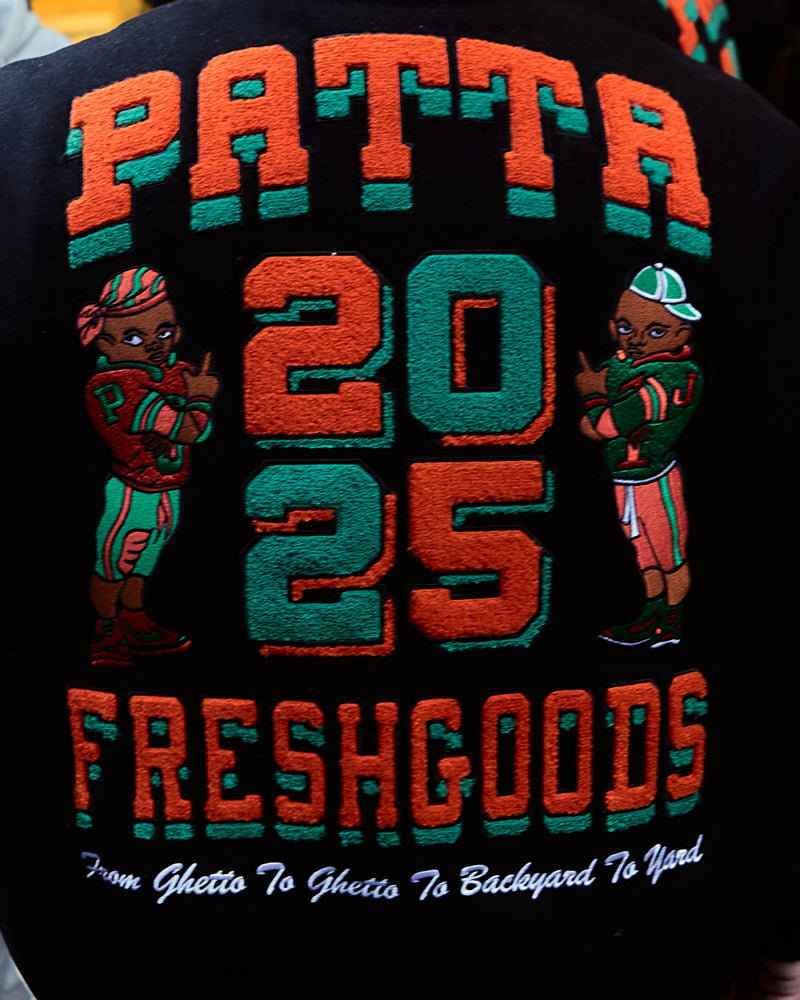
What went down at the Patta x Joe Freshgoods launch
What went down at the Patta x Joe Fre...
Patta and Joe Freshgoods came together right in the heart of the Dutch capital to celebrate community, creativity, and everyday spaces that raise us. Here is what went down as seen by Andrea Amponsah and Dennis Branko. We kicked things of at Patta Amsterdam before heading into the night at Contra for a night of fun, food, family and friends soundtracked by Bao G, NADIM, Cheyanne Hudson, DJ Drivah, and Lil’ Vic hosted by Mister V.I. Be sure to keep your eyes on our socials to be part of our next community event, word on the street is Berlin is next...-
What Went Down
-
-
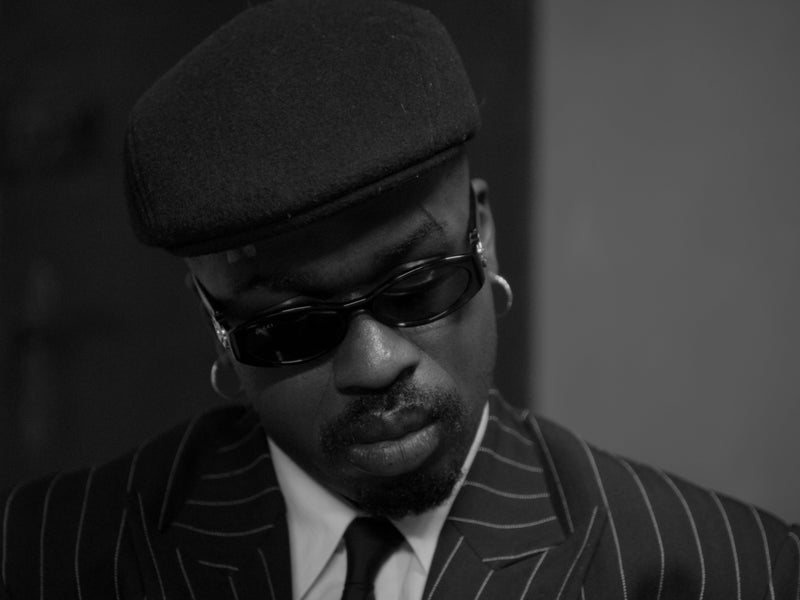
Get Familiar: BOJ
Get Familiar: BOJ
Interview by Passion DzengaFor more than a decade, BOJ has been one of the most quietly influential forces in contemporary African music. A pioneer of the alté movement long before it had a name, he built his world on experimentation, collaboration, and a refusal to be boxed in — working with everyone from Wizkid, Skepta, Dave and Tiwa Savage to Ayra Starr, Knucks and Obongjayar. But with his new album Duplicity (out December 5 via MOVE Recordings), BOJ turns his lens inward, crafting the most personal and revealing body of work of his career.Across thirteen tracks featuring Pa Salieu, Olamide, Odumodublvck, Show Dem Camp, SGaWD, Obongjayar, Joey B and more, Duplicity pushes the alté ethos into bold new terrain — blending Afropop, hip-hop, alté, Afrobeats and experimental club sounds with a clarity and confidence that only an artist a decade deep can carry. But beneath the genre-blurring production lies the album’s true centre: a meditation on duality. The BOJ the world sees — charismatic, collaborative, unmistakably influential — and the BOJ only a few truly know.It’s a theme that emerged unexpectedly from a personal moment. After hearing the word duplicitous in an argument and looking up its meaning, BOJ recognised a truth he felt almost everyone carries: the split between our public selves and our private ones. Duplicity became the space where he finally examined that divide with honesty — embracing both the extrovert the world encounters and the introspective figure who exists beyond the spotlight.The album’s visual identity deepens this narrative, contrasting light and dark, safety and danger, confidence and conflict. On record, those contrasts come alive through everything from the euphoric Afropop of “Imposter Syndrome” with Obongjayar to the menacing, experimental “Italawa” with Odumodublvck and SGaWD, the dance-floor lift of “Ijo,” and the endlessly catchy “Cana” with Pa Salieu.Sitting down with BOJ in the days leading up to the album’s release, we talk about the vulnerability behind Duplicity, the producers and collaborators who helped shape it, the evolution of alté, lessons learned after ten years in music, and how he stays grounded between Lagos and London. What emerges is an artist more self-aware than ever — expressing, not explaining; revealing, not performing. This is Duplicity through BOJ’s own words.You’ve got a new record coming out called Duplicity. What’s the concept, and what does it reflect about where you are personally and artistically?Duplicity is an album that describes me perfectly. The “two sides” are really about the duality of man – who you are in private versus what you choose to present to the world. For me it’s about trying to find the balance between those two selves in my life right now.You’ve said the album explores your public and private sides. What inspired you to open up like this at this point in your career?Honestly, it started with an argument I had with a partner. She used the word “duplicitous,” and I didn’t even know what it meant. I went to look it up and thought, “Yeah, everyone is duplicitous to some extent.” That sparked the idea to explore that theme fully.Did making Duplicity feel therapeutic? Were there parts of the process that surprised you about yourself?I don’t know if anything shocked me, but talking about situations like this at all is not something I’d usually do. So in that sense, yes. I definitely allowed myself to be more vulnerable at certain points, which is new for me.Sonically, the album fuses Afropop, hip-hop and more. Were there any guiding principles for the sound while you were making it?Not really – if anything, it was the opposite. We weren’t trying to tailor it to any particular sound. I told Junior, the producer I worked most closely with, “Let’s just be free. Whatever comes out, we go with it.” No box, no strict formula.You’re often called a pioneer in the alté movement. Does Duplicity feel like a continuation of that sound or a departure?I always feel like my sound gets elevated as I grow, but with alté, people misunderstand it. There’s no fixed “alté sound.” Anything slightly left of centre gets labelled alté. For me, alté is really about not being boxed in – the freedom to create without restrictions. It’s a mentality, not a genre.Your process is usually very collaborative. Who are the key producers that shaped this record?This is actually the least collaborative I’ve ever been on a project. Genio did the lion’s share – I think 9 or 10 of the 13 tracks. Spax is someone I also worked closely with. Blaise Beats is a producer I’ve wanted to release something with for a while – he’d sent me packs in the past, but nothing had come out until now. On this album though, Genio is the main architect.You’ve also got loads of guest features, how did you decide who to bring into the world of Duplicity?I like working with people I already have relationships with. I’ll record a song, sit with it, then ask, “Who can help me tell this story?” Everyone on the project is someone I genuinely rate musically and can reach with a phone call. They understand me and the themes because we already talk in real life.You’ve collaborated with everyone from Odumodublvck to Wizkid and Skepta. What’s the one common thread that makes a collaboration really click for you?If I had to boil it down to one thing, it’s the music itself – the sound. I look for high quality in someone’s expression, and originality. Most people I work with have that.We recently hosted an Odumodublvck show in Amsterdam. You two have a strong collaborative history. What’s it like working with him?Odu is really cool – we’re pretty close. He’s one of those people who always speaks his mind, no matter what. I admire that. Musically, we just click – we probably have more collaborations together than I have with anyone else.Visually, the singles and artwork all tie into duality. How did you approach the visual storytelling for Duplicity, and who did you work with?I worked closely with a guy called Niyi Okoewo. I had him over, played him the music, told him what films I was watching, where my head was at. He just got it. He suggested directors, and even decided to shoot the photography himself. Everything came together organically.With this record, it feels like you’re proving alté is more a philosophy than a genre – especially by showing both sides of yourself. Is that intentional?That is what I’m doing, but I’m not consciously trying to prove anything or break any box. I’m just expressing myself as honestly as I can. However people interpret that is up to them.How do you stay true to your roots while still appealing to your audience? Has much changed since we last spoke?Yeah, there’s definitely been a change – mostly in mentality. I’ve learned a few lessons along the way. My sound keeps evolving, but the bigger shift is in how I see people and myself.In what way has your mentality changed?I’ve learned to let people be who they are, to choose who I keep around, and accept that everyone has shortcomings. No one’s perfect. I’ve also realised you have to be intentional about knowing yourself. Self-knowledge doesn’t just happen – you have to put in the work.After 10 years in music, what would you tell your younger self if you could go back?I don’t think I’d tell him anything crazy. I’d still want to make all the same mistakes; they made me who I am. The only thing I might change is warning myself not to associate with certain people.For someone discovering you through Duplicity, what is the best way to listen to it?They can start anywhere. I usually make my intros and outros so they could swap – the outro could be the intro and vice versa. You can start from track one or from the end. It all flows. That said, I prefer they start from track one.The album’s out on Friday. What can people expect from you in the next few months?There are things coming, but I don’t like giving too much away. I’ll let people know as it happens. If you want to stay updated, just follow me on socials.You spend time between Nigeria and the UK. Is there a difference in how your music is received in London versus Lagos?I’m in Lagos now. To be honest, I don’t think there’s a huge difference. I cater to a certain demographic – a certain taste level – and that listener exists in both places. It feels similar across cities, even globally.You recently held a listening party in London. What was that experience like?It was dope – a small listening session with friends and day-one supporters. We played the songs, especially the one with Odu, and just vibed. People really liked it.You’ve got another listening party coming up in Lagos. What can people expect? It’s basically the Lagos version of the London night. Day-ones will come through, we’ll play the album, I’ll talk through the songs and the mindset behind them. Just a proper vibe.And if people want to attend the Lagos listening party, how do they get access?They just need to RSVP through the channels we’ve shared. Once that’s done, they’re in. If they aren’t in Lagos they can stream the record, it comes out on the same day.-
Get Familiar
-
-
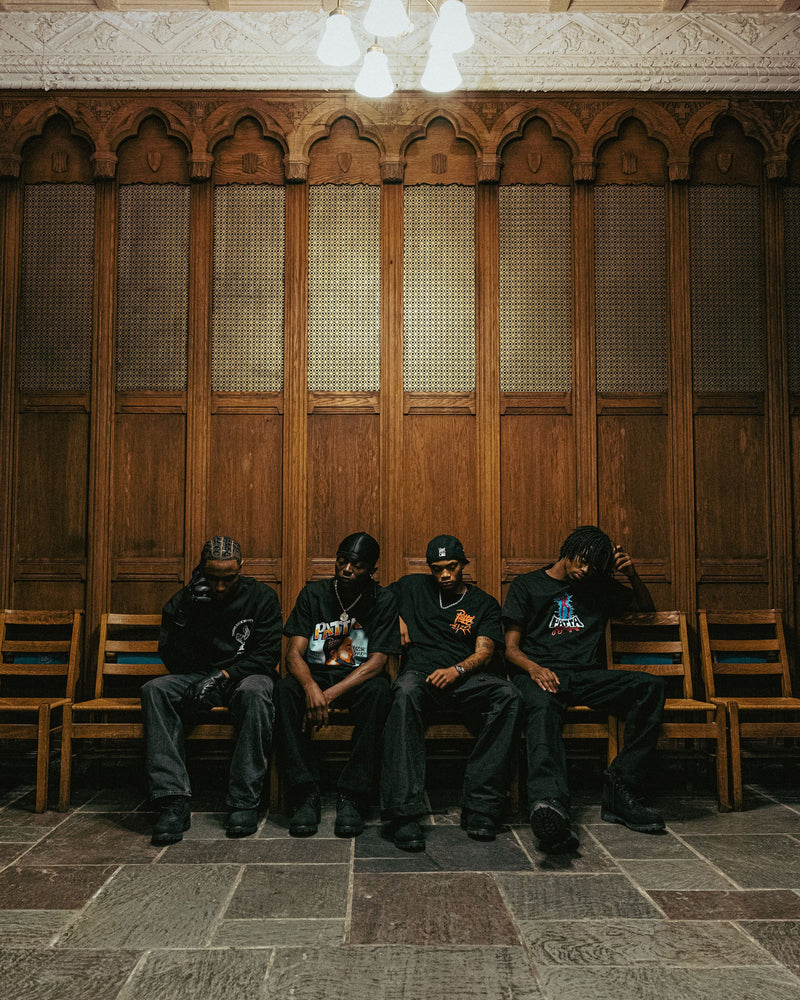
Patta x Joe Freshgoods
Patta x Joe Freshgoods









